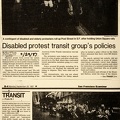San Francisco Chronicle 9/28/87
S.F Protest For Disabled Turns Violent
By Evelynn C. White
A peaceful demonstration for the rights of the disabled to use public transit turned violent last night when 23 people were arrested, one of them on charges of assaulting a police officer.
Following a rally at Union Square, 500 demonstrators converged on City Hall, where members of the American Public Transportation Association were holding a dinner meeting. Police said the melee broke out when demonstrators tried to block members from entering in the meeting.
San Francisco police officer Michael Travis, 40, who was thrown down the City Halls steps in the scuffle, was treated for a possible concussion and released. Arrested in the assaulted was Alan Shipley, 40, of San Francisco, who police said is not disabled.
Shipley was booked at city jail on charges of assaulted and battery on an officer and resisting arrest. The other 22 demonstrators, 19 of them wheelchair-bound were cited for failure to disperse, blocking a sidewalk and resisting arrest. They were released.
Earlier in the day, 250 demonstrators at Union Square, 80 percent in wheelchairs, made a plea for better access to public transit.
“In most cities, a person who is disabled can’t go to work, can’t go to school, can’t function,” said Laverne Chase, a wheelchair-bound resident of Washington, D.C. “I am here because I believe that disabled people should have equal access to everything that the mind can imagine, starting with public transportation.”
The protest, sponsored by the September Alliance for Accessible Transit, was held in opposition to the APTA, which is convening in the city through the week.
In the early 1980s, APTA fought to rescind federal regulations that would have required wheelchair lifts in all newly purchased transit buses and handicapped accessibility to all new rail systems. The organization instead lobbied for a “local option” alternative that allows individual transit systems to determine the best way to serve the handicapped.
On Wednesday, the association plans to hold a session concerning the needs of the disabled.
"We don't feel it's appropriate to leave it up to local operators,“said Berkeley resident Shelley Bergum. “There should be federal legislation that prohibits discrimination just like there is for housing and employment.“
In Anchorage, where 33-year—old Duane French lives, the “local option" has meant no public transportation at all for the disabled.
“I’m one of the lucky ones because I have a van,” said French. “But other wheelchair-bound people have to impose on friends and family plan weeks in advance to get where they need to go. They should be able to go down to a corner and get on a bus, to live their lives spontaneously.”
- Author
- San Francisco Chronicle, Evelynn C. White
- Created on
- Thursday 11 July 2013
- Posted on
- Thursday 3 August 2017
- Tags
- 1987, Anchorage, APTA - American Public Transit Association, arrests, assault, Berkeley, demonstration, Duane French, handicapped, Lavern Chase, local option, rescinded regs, SAAT, San Francisco, San Francisco City Hall, Shelly Begum, Union Square, wheelchair bound
- Albums
- Visits
- 1754
- Rating score
- no rate
- Rate this photo


0 comments